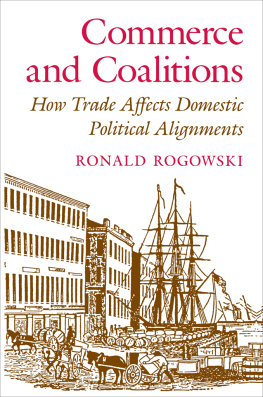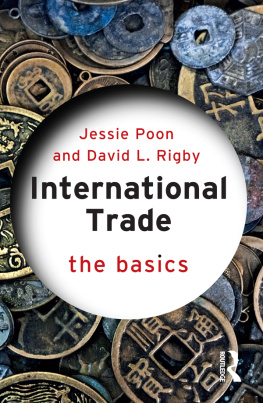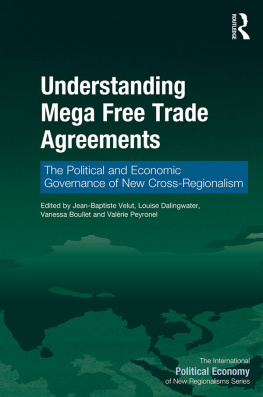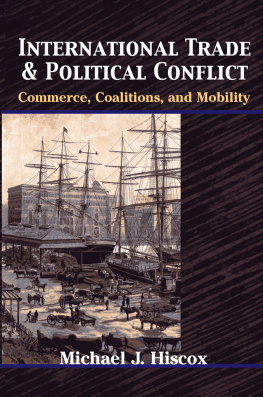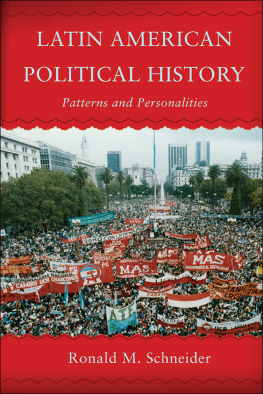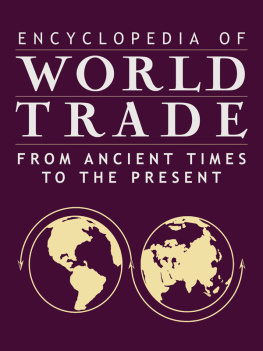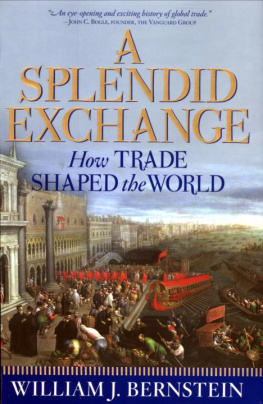Commerce and Coalitions
Commerce and Coalitions
HOW TRADE AFFECTS DOMESTIC
POLITICAL ALIGNMENTS
Ronald Rogowski
PRINCETON UNIVERSITY PRESS
PRINCETON, NEW JERSEY
Copyright 1989 by Princeton University Press
Published by Princeton University Press, 41 William Street,
Princeton, New Jersey 08540
In the United Kingdom: Princeton University Press, Chichester, West Sussex
All Rights Reserved
Library of Congress Cataloging-in-Publication Data
Rogowski, Ronald.
Commerce and coalitions : how trade affects domestic political alignments / Ronald Rogowski.
p. cm. Bibliography: p. Includes index.
ISBN 0-691-07812-2 (alk.paper)
ISBN 0-691-02330-1
eISBN 978-0-691-21943-1
1. International tradePolitical aspectsHistory. 2. Coalition (Social sciences)History. 3. Political stabilityHistory. 4. World politics. I. Title.
HF1379.R64 1989 382.3dcl9 89-3630
R0
FOR MY PARENTS,
Lindall and Iola Rogowski
Generalizations that are sound resemble a large-scale map of an extended terrain, such as an airplane pilot might use in crossing a continent. Such maps are essential for certain purposes just as more detailed maps are necessary for others. No one seeking a preliminary orientation to the terrain wants to know the location of every house and footpath. Still, if one explores on foot... there can be long periods when the investigator feels lost in an underbrush of facts inhabited by specialists engaged in savage disputes about whether the underbrush is a pine forest or a tropical jungle. He is unlikely to emerge from such encounters without scratches and bruises. And if he draws a map of the area he has visited, one of the natives may well accuse him of omitting his own house and clearing, a sad event if the researcher has actually found much sustenance and refreshment there. The outcry is likely to be all the sharper if at the end of the journey the explorer tries to set down in very brief form for those who may come later the most striking things he has seen.
Barrington Moore, Jr.,
Social Origins of Dictatorship and Democracy
List of Illustrations
FIGURES
MAPS
List of Tables
Preface and Acknowledgments
THE STORIES are familiar from the great studies of comparative politics, sociology, and history. In the 1860s, Americans divided over slavery and the tariff: western farmers joined northern workers and industrialists to oppose southern plantation owners. A decade later, German politics was riven by issues of protection and parliamentarism; but in that case industrialists, Junker estate owners, and smallholding peasants united against workers. In the Populist revolt of the 1890s, American politics was realigned: radical farmers of the West and South aroused the united opposition of urban workers and industrialists, insuring a Republican hegemony that endured until the depression of the 1930s. In that depression, Swedish and Norwegian farmers and workers forged Red-Green coalitions against urban elites; those same years of crisis engendered in Latin America populist alliances of urban workers, industrialists, and middle classes that undermined the traditional rule of landed elites. After World War ii, peasant revolutions swept much of Asia and some of Caribbean and Central America: tenant farmers and rural laborers, usually led by urban intellectuals, combated both rural and urban elites.
If the actors in these various dramas bear at least a similarity of nomenclature, their couplings and conflicts do not. Every possible permutation seems actually to have arisen at some historical juncture; certainly none can be excluded a priori. Moreover, as I shall try to show, cleavages and coalitions of these kinds do not belong only to our own age; they can be discerned with equal clarity in sixteenth-century Europe or ancient Greece.
Naturally enough, students of comparative politics have persistently endeavored to explain this bewildering array: to say why countries have the political cleavages that they do, and why those cleavages change. Among the many factors that have been adduced as partial explanations are preexisting cultural and religious divisions, the strength of the feudal tradition, the rapidity and timing of industrialization or of the grant of the mass suffrage, the sequence of crises of modernization, the institutional setting, the impact of foreign threat or invasion, andmost recentlythe product cycle.
I do not propose to deny the importance of any of these variables. Indeed, as will become clear in the several substantive chapters of this volume, no sensible explanation can dispense with them. I shall however argue that a much fuller account can be had if one admits the relevance of a factor that, until now, has been almost universally neglected: externally induced changes, in countries and regions with different factor endowments, in exposure to international trade.
To be sure, some studies of individual countries, and even a few comparative inquiries, have argued that domestic politics is affected by changing international trade in particular circumstances: Rosenberg (1943), Gerschenkron (1943), and more recently Gourevitch (1977; and 1986, chap. 3) have analyzed the ways in which cheaper imports, particularly of foodstuffs, affected domestic European cleavages and coalitions after 1873; Sunkel with Paz (1973), Cardoso and Faletto (1979), and others of the dependency school have pointed to shifting flows and patterns of trade as sources of Latin Americas volatile divisions and alliances. Cameron (1978) has argued that both leftist strength and the public sectors rate of growth may be affected by countries degrees of exposure to international trade. Abraham (1981) has attempted, in part, to link Weimar Germanys conflicts to its fluctuating export markets; and, perhaps most provocatively, Wallerstein (1974 and 1980) has contended that regional variations in political institutions and cleavages in the early modern period can be explained by the rise of a world market, and of an international division of labor within that market.
The argument that I undertake in this volume is more general. Briefly, I try to show that basic results of the theory of international tradeincluding, above all, the well-known theorem of Stolper and Samuelson (1941)imply that increases or decreases in the costs and difficulty of international trade should powerfully affect domestic political cleavages and should do so differently, but predictably, in countries with different factor endowments; and I suggest that these implications conform surprisingly well with what has been actually observed about patterns of cleavage, and about changes in those patterns, in a great variety of countries during five periods of global change in exposure to trade.
indicates both avenues of future research and ways in which the approach adopted here may be able to shed light on some other mysteries of comparative politics.
Despite the evidence that I shall be able to adduce in support of the theory, it remains conjectural and preliminary, and its application to specific cases is suggestive rather than conclusive. Much work remains to be done.
...
I have incurred many debts in the long gestation of this short book, and it is pleasant to redeem them, however partially, here. The greatest is surely to the Tuesday Luncheon Group in Political Economy at the University of California, Los Angeles, among whom I first read the original Stolper-Samuelson article, and who encouraged and repeatedly sharpened my halting efforts to see in it a broader political significance. Within that group, I owe a special debt to my colleague Michael Wallerstein; he above all pressed me to develop these ideas into publishable form.

